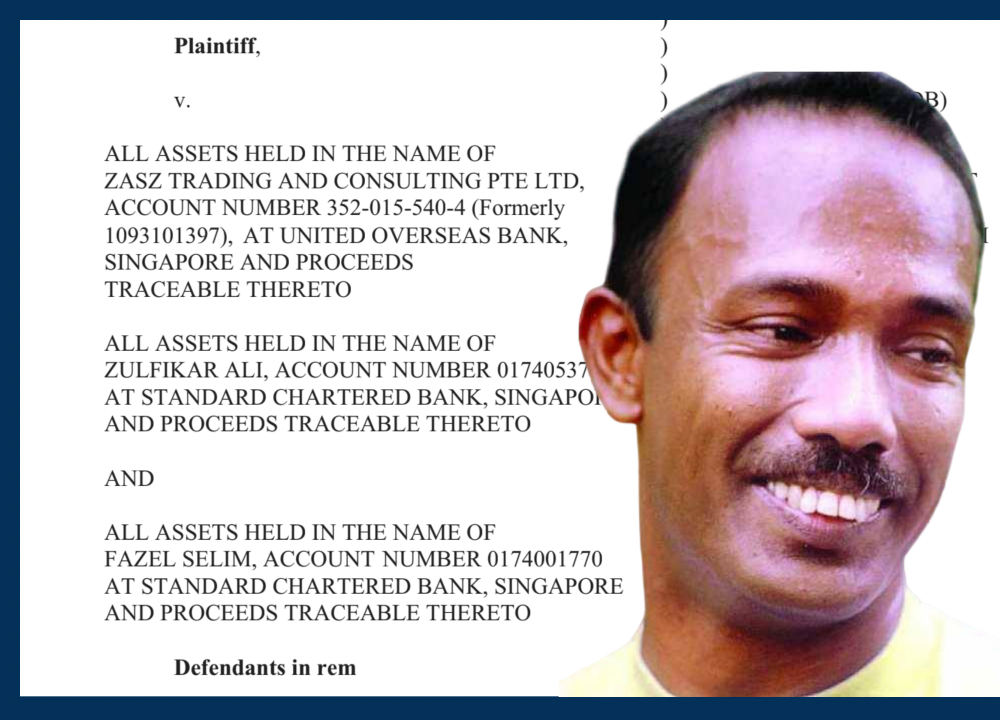Koko corruption
Corruption of Arafat “Koko” Rahman, according to US court records.

In its February 2019 decision, in a dispute between the Bangladesh government and the Canadian company Niko, the ICSID tribunal ruled that there was insufficient evidence to support corruption allegations made against influential figures in the last BNP government, including the former Prime Minister Khaleda Zia.
[Read the report: Khaleda and BNP leaders exonerated by international arbitration tribunal.]
This, however, has not always been the case. In 2009, the United States Department of Justice (DOJ) filed a successful application seeking forfeiture of money in three foreign bank accounts — one of which was controlled by Arafat “Koko” Rahman, the younger son of Khaleda Zia.
The DOJ application read, “As a result of interviews and analysis of financial records, it was determined that ‘Koko’ received bribes from several companies, including Siemens Bangladesh Limited and China Harbor Engineering Company. As the prime minister’s son, Koko in most cases was paid ‘protection money’ to ensure that he did not use his influence to obstruct the award process.”
According to the DOJ, the total bribes that Koko received from these two companies totalled $1,936,835. This money was put into an account held by a company, set up for Koko, called ZASZ Trading and Consulting Private Limited. Investigators found approximately $2,000,000 in the ZASZ bank account at United Overseas Bank in Singapore. The person who set up the account for Koko stated in an interview that there were no other transfers into the ZASZ account and that the extra money in it was interest from the deposited funds and thus directly traceable to the original criminal proceeds.
SIEMENS
In December 2008, Siemens and three of its subsidiaries including Siemens Bangladesh pleaded guilty to offences connected with payment of bribes for securing a government contract worth $41 million, to provide a digital mobile phone network in Bangladesh.
Siemens admitted that, from 2001 to 2006, the company facilitated a bribery scheme by engaging local “business consultants” whose sole function was to launder bribes. The company would pay bribes to various Bangladeshi officials and their family members in exchange for favourable treatment for its mobile network project. And this included bribes paid to Koko.
One of the business consultants hired by Siemens to facilitate bribery, Zulfikar Ali, confirmed that he knew the money he was paid by Siemens was to be used to pay bribes in order to assist Siemens winning the bid, and that both he and Siemens knew that if relatives, such as Koko, were not paid money, they could, by virtue of their proximity to the Bangladeshi prime minister, kill the project. The DOJ investigation revealed that at least $5.3 million were paid in bribes by Siemens to get the contract.
When asked pointedly about payments made to Koko, Ali told investigators that Koko approached him and demanded bribes in connection with the project. Ali claimed that he complained about Koko to the businessman Giasuddin Al Mamun, who was known then as a close friend of Tarique Rahman, Khaleda Zia’s elder son. Mamun told Ali that he could not control Koko. If the extortion money was not paid to Koko, Ali added, the prime minister’s son could have jeopardised Simen’s chance of getting the contract.
Zulfikar Ali also told the DOJ investigators that it was a local Siemens executive who instructed him to wire transfer $180,000 to a USD account in Singapore, in the name of ZASZ Trading and Consulting Private Limited and for the benefit of Koko.
The investigation revealed that ZASZ was created as a Singapore company at the direction of Koko by Lim Siew Cheng of Henry Noon & Co. Management Consultants. This was revealed by Cheng himself when US investigators interviewed him.
CHINA HARBOR ENGINEERING COMPANY
In 2003, China Harbor Engineering Company was bidding on a tender for building the New Mooring container terminal (NCT) in Bangladesh. The contract was valued at approximately $131,000,000. The DOJ investigation revealed that, similar to the mobile network project, “payments were made to Koko to influence the bidding process and to ensure that Koko would not obstruct the award of the project to China Harbor.”
China Harbor was awarded the project. According to a Memorandum of Understanding (MOU) dated December 5th 2004, the company agreed to pay at least 19 crore taka to its Bangladesh representatives (for winning the contract) and to “AKM Musa Kajol […] for payment to other officials.” AKM Musa Kajol was a director of Gatco, a Bangladeshi company dealing with container handling. According to DOJ investigators, a portion of this money was used to pay Koko in relation to the NCT project. The son of the former inland marine minister also confessed that he and Koko received bribes from China Harbor.
Payments for Koko in connection to the NCT project were sent to him via wire transfer in around May 2005, when two transfers of $626,828 and $565,359 were made from China Harbor to the ZASZ account account in Singapore. In August 2005, the ZASZ account in Singapore received another wire transfer of $564,658 from China Harbor.
Koko died in January 2015, in Malaysia.
In 2012, commenting on allegations against Koko, Khaleda Zia said, “The government has falsely implicated Koko in corruption cases and now they are smearing him. Koko’s name was not found in any documents.”
Netra News reached out to a BNP spokesperson for a comment. While the BNP did not officially respond to this request, the spokesperson noted that Koko had never been a member of the party, and that now that he was dead he was not able to respond to allegations made against him.●
🔗 US DOJ complaint for forfeiture, in the US District Court for DC.